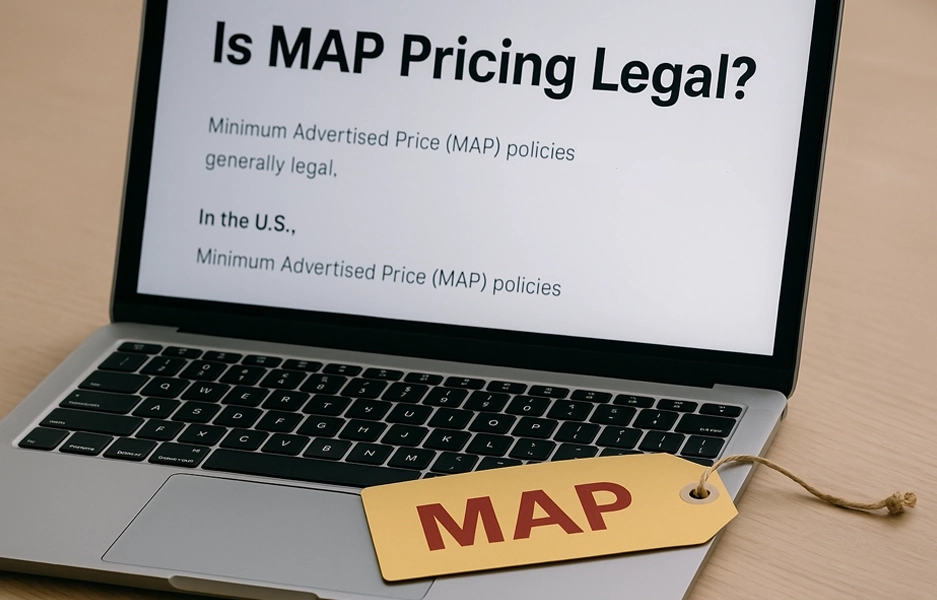If you sell products online—whether on Amazon, Walmart, or through brick-and-mortar retailers—you’ve likely heard of Minimum Advertised Price (MAP) policies. These policies are a vital tool for protecting your brand’s value, ensuring fair competition, and avoiding price erosion. But there’s one question that comes up again and again: Is MAP pricing legal?
The short answer is: it depends on where you operate. In the United States and Canada, MAP policies are generally legal. In the European Union, they’re typically not. But the real answer is a little more nuanced, and understanding it can make the difference between a policy that works and one that puts you at risk.
MAP Pricing Legality by Region
United States & Canada – Generally Legal
- MAP policies are unilateral — set by the manufacturer without requiring agreement from retailers.
- They control only the advertised price, not the actual selling price. Retailers can still sell below MAP if they don’t advertise the lower price.
- Not enforceable in court: A manufacturer can’t sue a retailer for violating a MAP policy, but it can end or restrict the business relationship.
- Widely used in industries like electronics, sporting goods, luxury goods, and consumer packaged goods to protect brand equity.
European Union – Generally Not Legal
- MAP policies are often considered a restriction of competition under EU law.
- Enforcing a MAP policy in the EU can lead to regulatory penalties.
- Brands operating internationally must adapt their strategy to comply with local laws.

Understanding MAP Policies
Before deciding whether MAP is right for your brand, it’s worth understanding the core components.
First, MAP is a manufacturer-driven policy. You decide the minimum advertised price for your products and communicate it to your retailers. It’s not a negotiation; it’s a condition of doing business.
Second, MAP is about perception as much as it is about profit. When customers consistently see your products advertised at a certain price, it reinforces the value of your brand.
Third, enforcement is a matter of business choice, not legal obligation. While you can’t take a violating retailer to court in the U.S. or Canada, you can absolutely decide not to work with them.
You might be interested in reading this article: What is MAP Pricing?
Key Facts About MAP Policies
1. Unilateral Policy
Created solely by the manufacturer; not negotiated with retailers.
2. Advertised vs. Selling Price
MAP restricts only the advertised price. In the U.S. and Canada, a retailer can sell for less — they just can’t promote it at that lower price.
3. Enforcement Method
While MAP is not court-enforceable, brands can:
- End supply to non-compliant retailers
- Limit product allocations
- Remove co-op advertising benefits
4. International Variance
Legality changes by country. Always confirm compliance before applying policies globally.
5. Seek Legal Advice
Consult an attorney familiar with competition and trade laws before drafting or enforcing MAP policies, especially if you sell internationally.
Real-World Use Case: Protecting Pricing Integrity
Imagine you are a U.S.-based electronics brand selling premium headphones. A retailer advertises them at 20% below your MAP, creating downward pricing pressure. Even though you can’t sue in the U.S., you can:
- Notify the retailer of the violation
- End supply agreements if non-compliance continues
- Work with authorized sellers to maintain price consistency
Why MAP Compliance Matters for Brand Owners
A strong MAP policy does more than keep prices stable. It:
- Prevents price wars that can damage margins and brand perception.
- Maintains reseller relationships by ensuring fair competition.
- Supports brand equity by creating consistent customer expectations.
- Protects marketplace control, particularly on platforms like Amazon where price visibility is instant.
Imagine you’re a U.S.-based electronics brand selling premium headphones. One retailer starts advertising your best-selling model at 20% below your MAP. Competitors follow suit, and soon your margins collapse. Without a MAP policy—and a plan to enforce it—your pricing structure can unravel in weeks.

How Brand Alignment Helps Enforce MAP
While legality varies, effective enforcement always requires constant monitoring.
Brand Alignment helps brands:
- Monitor online channels for MAP violations in real time
- Validate infractions with documented proof
- Enforce policies through direct outreach and marketplace interventions
This proactive approach not only protects pricing but also strengthens reseller partnerships and customer trust.
Takeaway
- U.S. & Canada: MAP policies are generally legal, but enforced via business relationships — not lawsuits.
- EU: MAP policies are generally prohibited.
- Always adapt policies to local regulations and get legal guidance.
- Effective MAP strategy combines legal compliance with consistent monitoring and enforcement.
Thank you for reading our post, “Is MAP Pricing Legal? A Complete Guide for Brand Owners.” We hope you found it helpful.
Start Monitoring and Enforcing Your MAP Policies Across Marketplaces
Safeguard your margins, strengthen reseller partnerships, and maintain brand value with expert MAP monitoring and enforcement.





